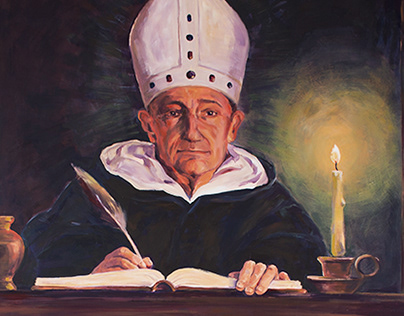Saint Albert the Great, also known as Albertus Magnus, was a German Dominican friar, philosopher, theologian, and scientist who played a pivotal role in the intellectual development of medieval Europe. He was born around 1206 in Lauingen, Bavaria, and is remembered for his extensive contributions to philosophy and natural sciences, as well as for his deep commitment to Christian life. Canonized in 1931 and declared a Doctor of the Church, he is the patron saint of scientists and philosophers, earning him the nickname “the Angel of Nature.”
Family Background
Albert was born into a noble family. His father, a German knight, was influential in the region, and his family background provided him with access to a quality education. The noble class was often pivotal in supporting educational institutions during the Middle Ages, and Albert’s early life reflects this emphasis on learning and intellectual pursuit. While specific details about his family are vague, it is understood that his upbringing instilled in him both a sense of duty and a desire for knowledge, which would later define his life’s work in both theology and the natural sciences.
Education and Early Life
Albert’s thirst for knowledge led him to different academic institutions, where he encountered various strands of thought, including Aristotelian philosophy, which significantly influenced his future writings. He joined the Dominican Order around 1223, a choice that emphasized his commitment to a life of poverty, community, and education. The order was renowned for its emphasis on preaching and teaching, aligning perfectly with Albert’s intellectual aspirations and spiritual goals.
During his formation in the Dominican Order, he studied under the influential theologian and philosopher, Saint Thomas Aquinas. Albert’s dedication to both faith and reason combined to create a robust intellectual framework that allowed him to synthesize Christian theology with Aristotle’s philosophies. This synthesis would become instrumental in the development of Scholasticism, a predominant philosophical school during the Middle Ages.
Preachings and Teachings
Saint Albert’s approach to teaching was characterized by a deep appreciation for the natural world. He believed that understanding creation could lead to a deeper understanding of God, which is reflected in his work “De causa rerum” (On the Causes of Things). He emphasized the importance of observation and reason, advocating for a naturalistic approach to theology that viewed faith and science as complementary rather than opposing forces.
His sermons and writings illustrate his commitment to the importance of intellect in comprehending divine truths. Albert’s teachings encouraged a sense of wonder about the created world, promoting the idea that studying nature is a form of communion with God. This integration of faith and reason was revolutionary, challenging the often dogmatic approach of his contemporaries.
Contributions to Natural Sciences
Saint Albert’s contributions to natural sciences are impressive. He wrote extensively on a wide range of subjects, including physics, biology, astronomy, and metaphysics. His works include “Summa Theologiae” and “Book of Minerals,” where he meticulously cataloged various substances and explored their properties, laying groundwork for future scientific inquiry.
Perhaps one of the most significant aspects of his scientific work was his ability to synthesize empirical observation with philosophical reasoning. He fostered an approach that valued direct observation and experimentation, which later influenced notable scientists, including his student, Thomas Aquinas, and other leading figures of the Renaissance and early Scientific Revolution.
Christian Life and Legacy
Albert’s Christian life was marked by a deep spirituality that informed all aspects of his work. As a Dominican, he was dedicated to a life of prayer, study, and communal living. His moral and ethical teachings emphasized the importance of charity, humility, and the pursuit of truth. He viewed intellectual prowess as a gift from God that should be used to serve others and to enhance one’s understanding of divine mysteries.
Saint Albert’s legacy endures in numerous ways. He is remembered not only as a great theologian and philosopher but also as one who bridged faith and science. His canonization and designation as a Doctor of the Church underscore the impact of his contributions to both religious and secular thought.
In summary, Saint Albert the Great stands as a towering figure in both the arenas of faith and reason. With a noble background that fostered a passion for education, he dedicated his life to preaching, teaching, and studying the natural world, championing the idea that understanding creation is crucial to understanding the Creator. His legacy as the patron saint of scientists and philosophers continues to inspire modern scholars to explore the relationship between faith and reason, making him a timeless figure in the quest for knowledge and truth. Through his life and works, Albert invites all to pursue wisdom and understanding in their spiritual and intellectual journeys.



